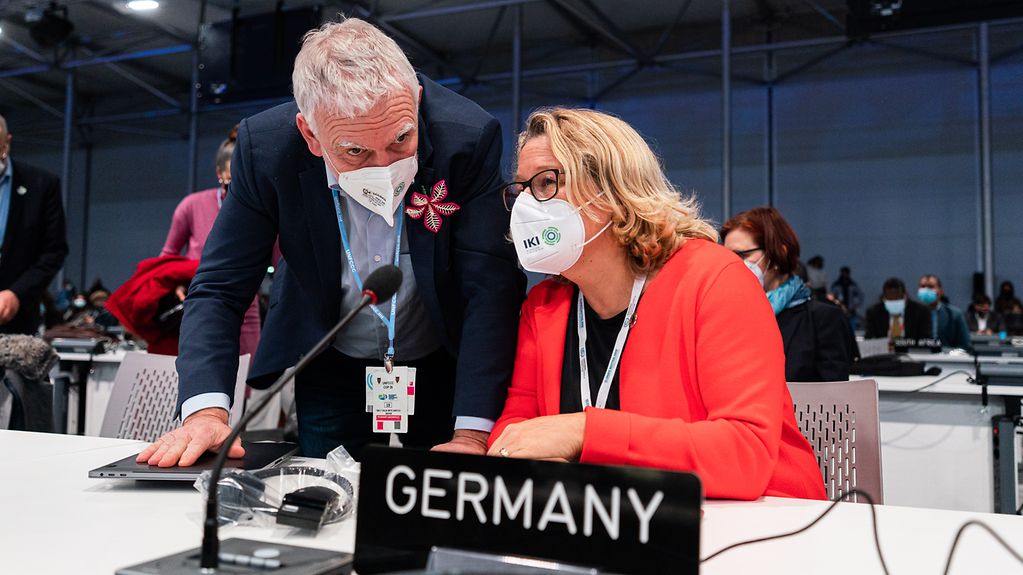26th UN Climate Change Conference
For the first time in the history of world climate conferences, all countries have agreed on an accelerated global energy transition away from coal-fired power. In order to limit global warming to 1.5 degrees Celsius, the signatory states have resolved to set more ambitious climate targets for 2030 as early as next year.
4 Min. Lesedauer

Federal Environment Minister Svenja Schulze and State Secretary for the Environment Jochen Flasbarth conducting the final negotiations at the World Climate Conference in Glasgow.
Foto: BMU/Sascha Hilgers
The 26th World Climate Conference (COP26) in Glasgow ended with the adoption of far-reaching resolutions on international climate protection. With the participation of the German delegation, the community of states stipulated for the first time that coal-fired energy is to be phased down. In addition, inefficient subsidies for oil, gas and coal are to be scrapped.
As Federal Environment Minister Svenja Schulze: “This conference has shown that the world shares a common goal – a climate-neutral global economy. The age of fossil fuels is coming to an end, and the energy transition is becoming the guiding principle worldwide.”
Faster action to curb global warming
The signatory states stressed that more has to be done at the national level in the course of this decade to limit global warming to 1.5 degrees Celsius. For this reason, the final declaration of the Glasgow conference calls on states to set more ambitious climate targets by 2022 and 2030. In future, the gap to the 1.5 degree target will be reviewed annually, not just every five years. The European Union has already enshrined more rigorous climate protection targets in its legislation. Germany is seeking to achieve climate neutrality by as early as 2045 and reduce greenhouse gas emissions by at least 65 percent by 2030.
“Glasgow has led to a definite acceleration in climate protection, something that is very much needed. The 2020s is the decade in which the global community can and must make crucial progress,” said Federal Environment Minister Svenja Schulze.
Support for developing countries
When it comes to tackling climate change worldwide, developing countries are in particular need of support. The joint goal of the industrialised countries to mobilise 100 billion US dollars per year for this purpose is expected to be met from 2023 onwards. In 2019, Germany already exceeded its pledge to increase international climate financing to four billion euros by 2020 and aims to boost this contribution to six billion euros by no later than 2025.
In Glasgow, the states agreed to double aid for adapting to the impact of climate change by 2025. Germany is increasing its multilateral investment in adaptation finance by an additional 150 million euros. The Federal Ministry for Economic Cooperation and Development will provide 100 million euros for the Global Environment Facility fund to help the very poorest countries, while the Federal Ministry for the Environment will contribute 50 million euros to the Adaptation Fund. All in all, Germany is contributing a total of some two billion euros per year to international adaptation finance, making it one of the leading contributors.
Rulebook for the implementation of the Paris Agreement
Another achievement of the 26th World Climate Conference was establishing a common set of rules for international climate protection. In order to be able to review and compare climate targets more effectively, uniform reporting obligations and five-year reference periods will apply in future. In the area of emission certificates trading it was possible to close loopholes so that climate protection efforts cannot be counted twice.
Arguing in favour of carbon pricing
At the inaugural meeting of heads of state and government on 1 November Federal Chancellor Angela Merkel said: “Not only do we have to implement the Paris Agreement, I also believe we are capable of doing so.” However, the global community would not make progress based on government activities alone, she added. “What is really needed is a comprehensive transformation of the way we live and work and of our entire economy,” said Merkel.
The Federal Chancellor highlighted carbon pricingas an effective and economically sound instrument to encourage industry and business worldwide to find the technologically best and most efficient ways of achieving climate neutrality. Merkel also stressed the importance of stopping global forest loss by 2030.
Specific climate protection measures
The World Climate Conference has achieved concrete progress in terms of specific climate protection measures, too. Germany has announced an initiative to help South Africa end coal-fired energy production. Another alliance of several countries stipulates that by the end of 2022, the signatory states – including Germany – will no longer invest state funds in coal, oil and natural gas projects in other countries. Certain exceptions apply here, including gas plants that can operate on climate-friendly hydrogen in the future. Together with about hundred other countries, Germany has also pledged to reduce emissions of methane – a greenhouse gas that is particularly damaging to the climate – by 30 percent by 2030.